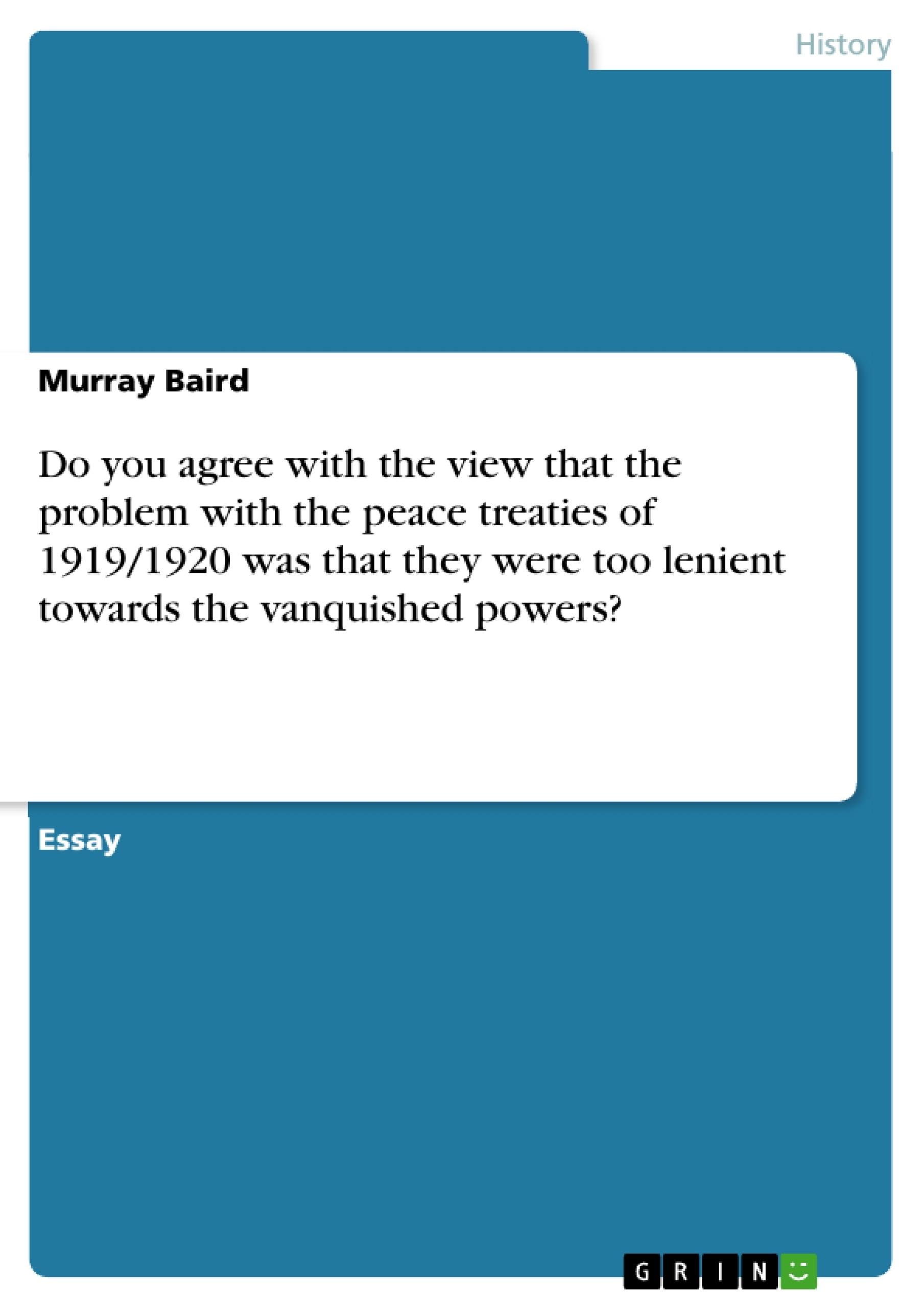Excerpt
The deliberations of the peacemakers between 1919 and 1920 failed to establish an enduring peace for multifarious reasons, but not because the peace treaties were too lenient towards the vanquished powers. After all, the negotiators did not begin with a blank piece of paper. Rather, certain curbs were placed on them. Technically defeated, but practically unoccupied the Central Powers, and in particular Germany, remained largely intact and the pre-war counterweight to German power in the form of the Russian and Habsburg Empires no longer existed. Concomitantly, encroaching Russian Bolshevism created a dichotomy as to the treatment of the vanquished powers. Moreover, the main players in the peace conferences brought with them not only their varied personalities but also their different aims and aspirations, tempered by domestic political strategy and public opinion. President Wilson’s Fourteen points raised expectations too high and clashed both with reality and the imperialistic aims of other peacemakers. In addition, the imbroglio that was rampant post-war nationalism was neither fully understood nor remedies consistently applied. Finally, the open sore created by the so-called war guilt cause and reparations festered until it became a cancerous growth consuming the very tissue of the peace treaties and simultaneously gave the vanquished nations reasons to break the treaties.
Although Dockrill and Goold claim that, with the exception of the United States, the Allies gained a Phyricc Victory[1] , structurally and materially Germany at least amongst the Central Powers emerged from World War One in a more favourable position for recovery than did Belgium or France. Germany’s industries and infrastructures remained largely intact. Moreover, Germany sought armistice terms whilst, with the exception of the Rhineland, it was unoccupied by Allied troops. With a comprehensive victory over Russia in the east, together with a perceived stalemate on the western front, the German populace was entitled to believe that the war had never been lost when their troops could “return unvanquished from the battlefield.”[2] Moreover, the public clamour for the speedy demobilization of Allied troops and a war weariness which rendered the Allied populations unable of “feeling or caring beyond the immediate questions of our own material wellbeing”[3] made a return to war to enforce treaties, not only political suicide, but a practical impossibility. The impotence of Allied negotiators to enforce peace treaties is further evident in their inability to act against Serb, Romanian and Czech land grabbing in Hungary which undoubtedly assisted in destabilising the government and enabling Bela Kun to establish a Bolshevik Republic in Hungary. So, although MacMillan alludes to Allied leniency leaving Germany too strong[4] , the Allies were unable to enforce treaties on vanquished powers which were neither prepared for defeat, nor accepted that they had been defeated. In addition, without outright occupation of the vanquished nations the negotiators hoped for co-operation from the defeated nations as they were severely restricted in enforcing treaties by armed intervention.
A further constraint on the peacemakers was the destruction of the traditional counterweight to German power of the Russian Empire and “the tearing up of the Austrian Empire into disparate and unconnected fragments.”[5] Schulz may claim that the collapse of Europe’s strongest military powers allowed the Allies to “be objectively free to decide their policies without limiting factors”[6] when, in fact, the opposite was the case. As we have seen, Germany remained in a strong post-war position and together with a myriad of small, insecure succession states emerging from the remains of Austria-Hungary and the Russian Empire it was not possible to re-establish any substantial equipoise in the European balance of power. Perhaps a more open dialogue between the peacemakers and the rival White Russian and Bolshevik factions beyond the abortive Prinkipo negotiations may have been productive in maintaining Russia as a powerful ally. However, uncertainties as to the outcome of the Russian civil war, Allied reluctance to intervene and the potential of encroaching Bolshevism precluded any meaningful dialogue. The peacemakers were therefore unable to create a lasting peace because the traditional European power structure was irretrievably lost and they were unable to create a new order from the small, disparate successor states.
[...]
[1] Dockrill M.L. and Goold J.D., Peace Without Promise. Britain and the Peace Conferences 1919 – 1923 (1981), p. 253 – 256.
[2] President Ebert quoted in Henig R., “The Treaty of Versailles 80 Years On” in Modern History Review Volume 12 (4, April 2001), p.4.
[3] J.M. Keynes quoted in Roberts J.M., Europe 1880 – 1945 (1989), p.320.
4 MacMillan M. Peacemakers. The Paris Peace Conference of 1919 and its Attempts to End War (2001), p. 495-496.
[5] D. Lloyd George in The Truth About the Peace Treaties Volume 1 (1938), p. 90.
[6] Schulz G., in Revolutions and Peace Treaties 1917 – 1920 (1967), p. 90.
- Quote paper
- Murray Baird (Author), 2002, Do you agree with the view that the problem with the peace treaties of 1919/1920 was that they were too lenient towards the vanquished powers?, Munich, GRIN Verlag, https://www.grin.com/document/201887
Publish now - it's free






















Comments